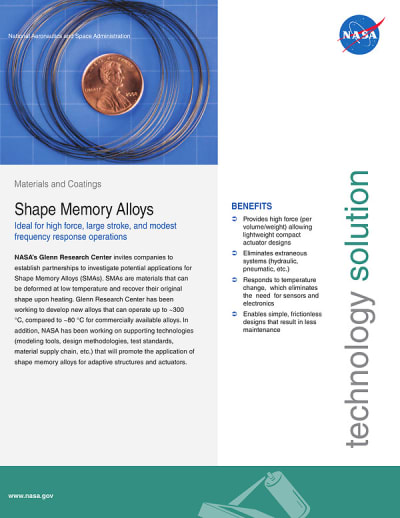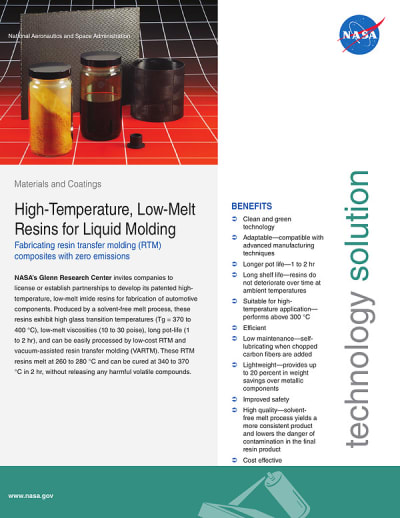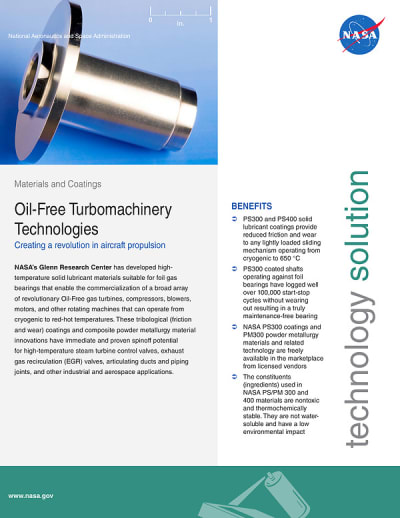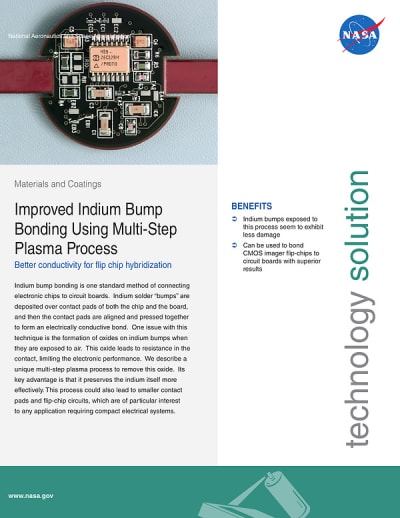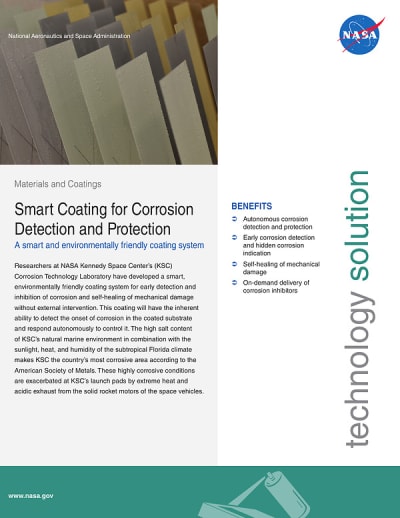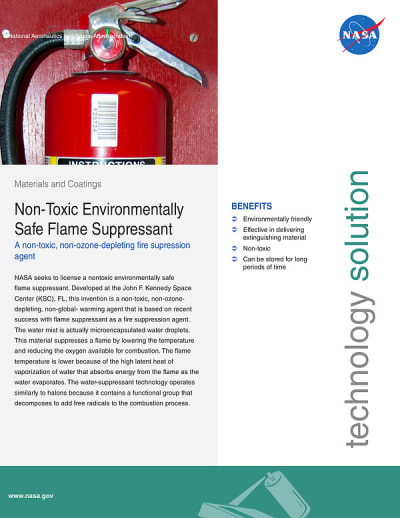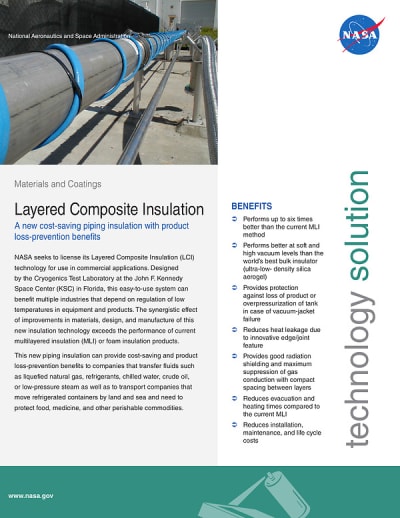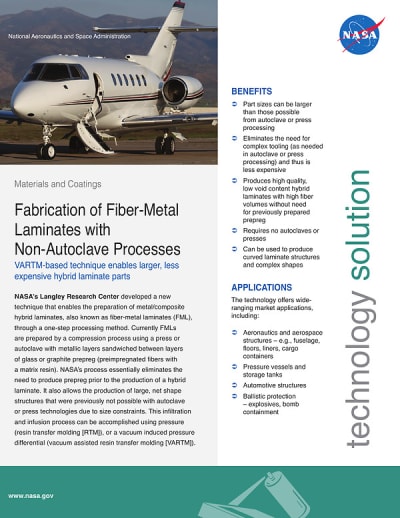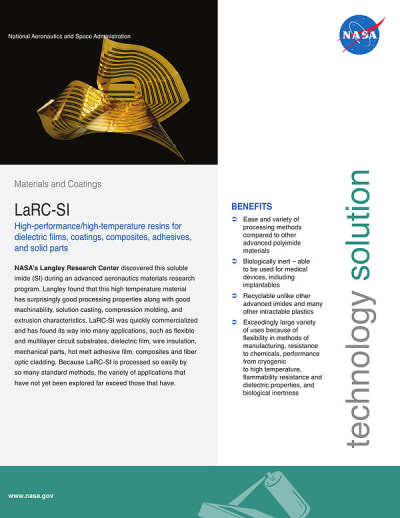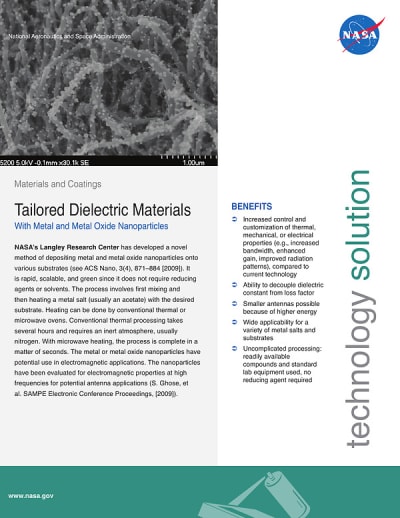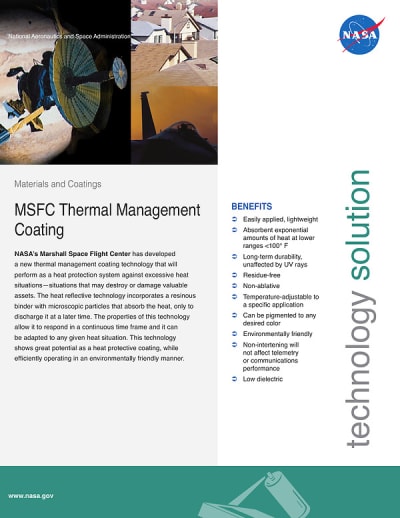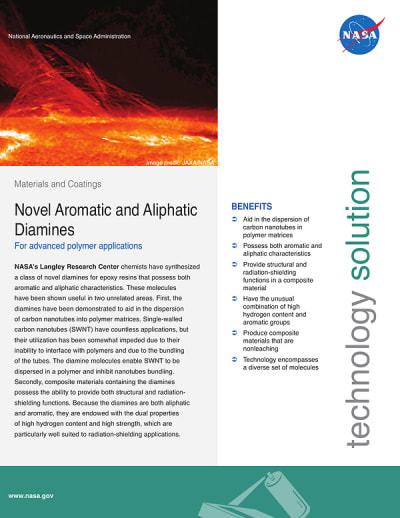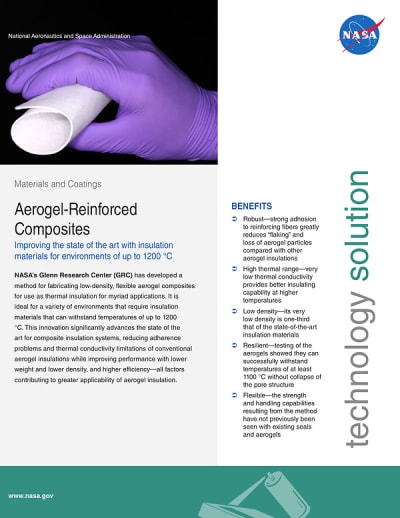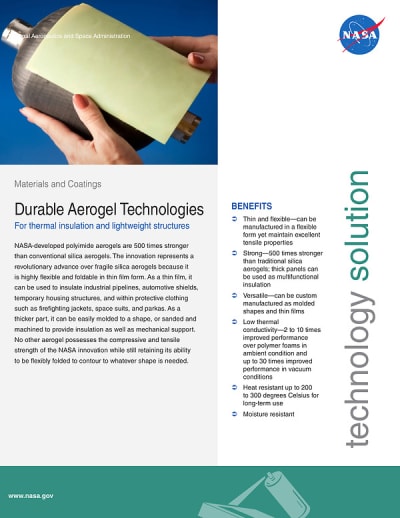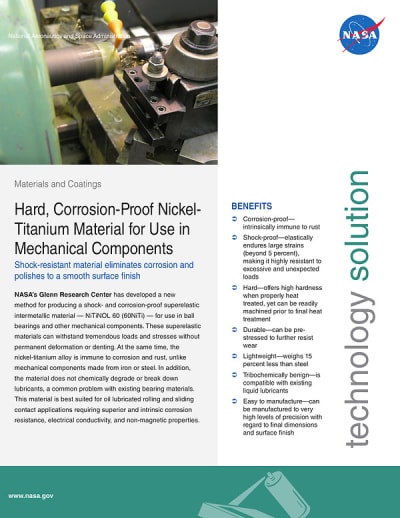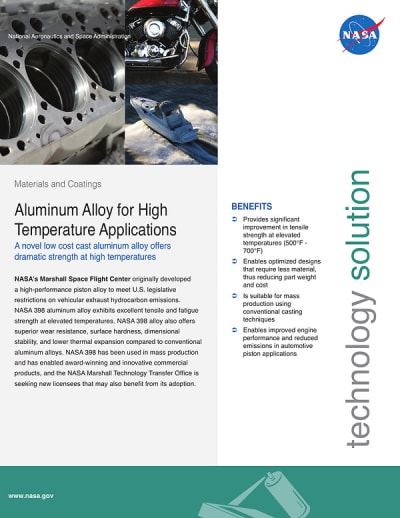Shape Memory Alloys
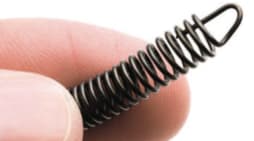 Shape Memory Alloys (SMAs) can be deformed at low temperature and recover their original shape upon heating. New alloys can operate up to ~300 °C, compared to ~80 °C for commercially available alloys. SMAs can be used in adaptive structures, actuators, heat detection devices, medical devices, high-temperature automotive components, aeronautics, and military.
Shape Memory Alloys (SMAs) can be deformed at low temperature and recover their original shape upon heating. New alloys can operate up to ~300 °C, compared to ~80 °C for commercially available alloys. SMAs can be used in adaptive structures, actuators, heat detection devices, medical devices, high-temperature automotive components, aeronautics, and military.
High-Temperature, Low-Melt Resins for Liquid Molding
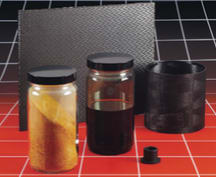 High-temperature, low-melt imide resins developed for fabrication of automotive components are produced by a solvent-free melt process. They exhibit high glass transition temperatures, low melt viscosities, long pot-life, and can be easily processed by low-cost RTM and vacuum-assisted resin transfer molding. Applications include injection molding of parts, high-temperature engine components, and composite ducts and tubes.
High-temperature, low-melt imide resins developed for fabrication of automotive components are produced by a solvent-free melt process. They exhibit high glass transition temperatures, low melt viscosities, long pot-life, and can be easily processed by low-cost RTM and vacuum-assisted resin transfer molding. Applications include injection molding of parts, high-temperature engine components, and composite ducts and tubes.
Oil-Free Turbomachinery Technologies
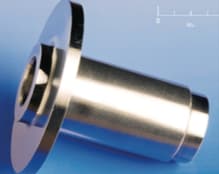 High-temperature solid lubricant materials suitable for foil gas bearings enable the commercialization of a broad array of oil-free gas turbines, compressors, blowers, motors, and other rotating machines that can operate from cryogenic to red-hot temperatures. These tribological coatings and composite powder metallurgy materials have applications in high-temperature steam turbine control valves and other industrial and aerospace applications.
High-temperature solid lubricant materials suitable for foil gas bearings enable the commercialization of a broad array of oil-free gas turbines, compressors, blowers, motors, and other rotating machines that can operate from cryogenic to red-hot temperatures. These tribological coatings and composite powder metallurgy materials have applications in high-temperature steam turbine control valves and other industrial and aerospace applications.
Improved Indium Bump Bonding Using Multi-Step Plasma Process
 Indium bump bonding is a standard method of connecting electronic chips to circuit boards. Indium solder “bumps” are deposited over contact pads of both the chip and the board, and then the contact pads are aligned and pressed together to form an electrically conductive bond. However, oxides can form on indium bumps when they are exposed to air. A new multi-step plasma process removes this oxide.
Indium bump bonding is a standard method of connecting electronic chips to circuit boards. Indium solder “bumps” are deposited over contact pads of both the chip and the board, and then the contact pads are aligned and pressed together to form an electrically conductive bond. However, oxides can form on indium bumps when they are exposed to air. A new multi-step plasma process removes this oxide.
Smart Coating for Corrosion Detection and Protection
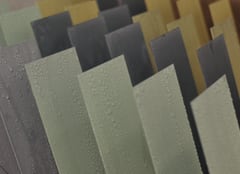 A smart, environmentally friendly coating system enables early detection and inhibition of corrosion, and self-healing of mechanical damage without external intervention. The smart coating is based on microcapsules and particles pioneered by NASA. The coating detects corrosion in its early stages, inhibits it, and/or repairs the coating.
A smart, environmentally friendly coating system enables early detection and inhibition of corrosion, and self-healing of mechanical damage without external intervention. The smart coating is based on microcapsules and particles pioneered by NASA. The coating detects corrosion in its early stages, inhibits it, and/or repairs the coating.
Non-Toxic Environmentally Safe Flame Suppressant
This non-toxic, non-ozone-depleting, non-global-warming agent is based on recent success with flame suppressant as a fire suppression agent. The material suppresses a flame by lowering the temperature and reducing the oxygen available for combustion. The water-suppressant technology operates similarly to Halons because it contains a functional group that decomposes to add free radicals to the combustion process.
Layered Composite Insulation
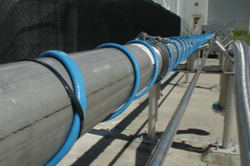 LCI technology can benefit multiple industries that depend on regulation of low temperatures in equipment and products. Improvements in materials, design, and manufacture of the insulation exceed the performance of current multilayered insulation (MLI) or foam insulation products. The insulation may be used for regulating a critical low-temperature environment in industries such as cryogenics, medical, and refrigerated vehicles.
LCI technology can benefit multiple industries that depend on regulation of low temperatures in equipment and products. Improvements in materials, design, and manufacture of the insulation exceed the performance of current multilayered insulation (MLI) or foam insulation products. The insulation may be used for regulating a critical low-temperature environment in industries such as cryogenics, medical, and refrigerated vehicles.
Fabrication of Fiber-Metal Laminates with Non-Autoclave Processes
 This technique enables the preparation of metal/composite hybrid laminates, also known as fiber-metal laminates, through a one-step processing method. The process essentially eliminates the need to produce prepreg prior to the production of a hybrid laminate. Applications include aerospace structures such as fuselage, floors, liners, or cargo containers; ballistic protection; and automotive structures.
This technique enables the preparation of metal/composite hybrid laminates, also known as fiber-metal laminates, through a one-step processing method. The process essentially eliminates the need to produce prepreg prior to the production of a hybrid laminate. Applications include aerospace structures such as fuselage, floors, liners, or cargo containers; ballistic protection; and automotive structures.
LaRC-SI
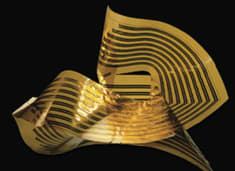 This high-temperature soluble imide has found its way into many applications, such as flexible and multilayer circuit substrates, dielectric film, wire insulation, mechanical parts, hot melt adhesive film, composites, and fiber optic cladding. The wholly aromatic thermoplastic polyimide is a self-bonding/non-curing resin with superior mechanical, electrical, and adhesive properties.
This high-temperature soluble imide has found its way into many applications, such as flexible and multilayer circuit substrates, dielectric film, wire insulation, mechanical parts, hot melt adhesive film, composites, and fiber optic cladding. The wholly aromatic thermoplastic polyimide is a self-bonding/non-curing resin with superior mechanical, electrical, and adhesive properties.
Tailored Dielectric Materials
A novel method deposits metal and metal oxide nanoparticles onto various substrates. It is rapid, scalable, and green since it does not require reducing agents or solvents. The metal or metal oxide nanoparticles have potential use in electromagnetic applications at high frequencies for potential antenna applications.
MSFC Thermal Management Coating
A new thermal management coating technology performs as a heat protection system against excessive heat situations that may destroy or damage valuable assets. The heat-reflective technology incorporates a resinous binder with microscopic particles that absorb the heat, only to discharge it at a later time. Uses include fire protection systems, paints, air conditioning systems, and automobiles.
Novel Aromatic and Aliphatic Diamines
NASA has synthesized a class of novel diamines for epoxy resins that possess both aromatic and aliphatic characteristics. These molecules have been shown useful in two unrelated areas: to aid in the dispersion of carbon nanotubes into polymer matrices, and composite materials containing the diamines possess the ability to provide both structural and radiation-shielding functions. The diamines possess high hydrogen content and high strength, which are particularly well suited to radiation-shielding applications.
Aerogel-Reinforced Composites
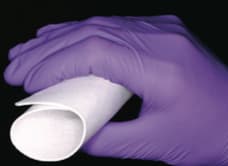 A new method fabricates low-density, flexible aerogel composites for use as thermal insulation. It is ideal for environments that require insulation materials that can withstand temperatures of up to 1200 °C. The technology has applications in environments requiring insulation in temperatures of up to 1100 °C, including insulation for thermal protection systems, heat shields, and fire blankets.
A new method fabricates low-density, flexible aerogel composites for use as thermal insulation. It is ideal for environments that require insulation materials that can withstand temperatures of up to 1200 °C. The technology has applications in environments requiring insulation in temperatures of up to 1100 °C, including insulation for thermal protection systems, heat shields, and fire blankets.
Durable Aerogel Technologies
 Polyimide aerogels are 500 times stronger than conventional silica aerogels. The innovation represents a revolutionary advance over fragile silica aerogels because it is highly flexible and foldable in thin film form. As a thin film, it can be used to insulate industrial pipelines, automotive shields, temporary housing structures, and within protective clothing such as firefighting jackets, space suits, and parkas.
Polyimide aerogels are 500 times stronger than conventional silica aerogels. The innovation represents a revolutionary advance over fragile silica aerogels because it is highly flexible and foldable in thin film form. As a thin film, it can be used to insulate industrial pipelines, automotive shields, temporary housing structures, and within protective clothing such as firefighting jackets, space suits, and parkas.
Hard, Corrosion-Proof Nickel-Titanium Material
A new method for producing a shock- and corrosion-proof superelastic intermetallic material — NiTiNOL 60 (60NiTi) — can be used in ball bearings and other mechanical components. These superelastic materials can withstand tremendous loads and stresses without permanent deformation or denting. At the same time, the nickel-titanium alloy is immune to corrosion and rust, unlike mechanical components made from iron or steel. In addition, the material does not chemically degrade or break down lubricants.
Aluminum Alloy for High-Temperature Applications
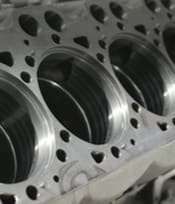 NASA 398 aluminum alloy exhibits excellent tensile and fatigue strength at elevated temperatures, and offers superior wear resistance, surface hardness, dimensional stability, and lower thermal expansion compared to conventional aluminum alloys. Applications include internal combustion engines and high-temperature components such as pistons, manifolds, brake calipers, cylinder heads, and heat exchangers.
NASA 398 aluminum alloy exhibits excellent tensile and fatigue strength at elevated temperatures, and offers superior wear resistance, surface hardness, dimensional stability, and lower thermal expansion compared to conventional aluminum alloys. Applications include internal combustion engines and high-temperature components such as pistons, manifolds, brake calipers, cylinder heads, and heat exchangers.
Overview
The document discusses NASA 398, a high-performance aluminum-silicon hypereutectic alloy developed by NASA's Marshall Space Flight Center. This alloy, which contains 16% silicon, is designed for applications requiring high mechanical loading at elevated temperatures, specifically between 500°F (260°C) and 700°F (370°C). It offers significant improvements in tensile strength compared to conventional aluminum alloys, making it suitable for various automotive components such as pistons, manifolds, brake calipers, cylinder heads, and heat exchangers.
Key benefits of NASA 398 include its ability to provide enhanced tensile strength at high temperatures, optimized designs that require less material, and suitability for mass production using conventional casting techniques. The alloy also boasts superior wear resistance, surface hardness, dimensional stability, and lower thermal expansion compared to traditional aluminum alloys. These properties contribute to improved engine performance and reduced emissions in automotive applications.
The document includes a table detailing the tensile properties of NASA 398-T5 (permanent mold) at various temperatures, showcasing its performance characteristics. For instance, at 75°F (25°C), the tensile strength is 40 ksi, while at 600°F (315°C), it drops to 22 ksi, illustrating the alloy's strength retention at elevated temperatures.
NASA's Technology Transfer Program aims to maximize the applications of its technologies to benefit U.S. citizens through partnerships and licensing agreements with industry. This initiative ensures that NASA's investments in research lead to secondary uses that enhance the economy, create jobs, and improve quality of life.
The document also mentions several patents related to NASA 398, indicating the innovation and protection of this technology. The NASA Marshall Technology Transfer Office is actively seeking new licensees to further promote the adoption of this advanced alloy in various industries.
In summary, NASA 398 represents a significant advancement in aluminum alloy technology, offering a combination of high strength, lightweight properties, and cost-effectiveness, making it a promising solution for high-temperature applications in the automotive sector and beyond.


